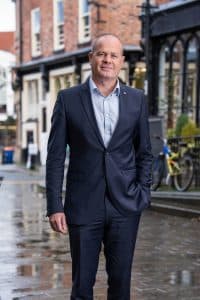Robust consumer spending and the impact of Brexit are fuelling a surge in the number of overseas companies setting up operations in the north west, say specialists at accounting and business advisory firm HURST.
Adrian Young, a tax partner at HURST, said the UK’s favourable tax environment is also a key driver.
The number of overseas companies seeking assistance from HURST has doubled over the past 18 months. The firm currently has around a dozen or more active cases on its books at any one time.
The work of HURST’s tax and international business specialists acting on behalf of foreign firms ranges from incorporating new companies and VAT registrations to advising on import processes, acquisitions and new inward investment structures.
Among the leading partner countries by value of inward investment into the UK or imports are EU nations such as Germany, France, the Netherlands, Belgium and Luxembourg, as well as the US and China.
Adrian said: “The north west closely mirrors this pattern and we to closely reflect this in the work we are doing in the HURST advisory team, for example helping Dutch and German businesses to incorporate new UK companies, advising US companies on acquisitions, and setting up new UK inward investment structures.
“Some common themes are emerging. Chief among them is finding an effective way to do business in the UK. This has partly been driven by the need to overcome Brexit-related barriers, but I think it is also symptomatic of a wider uptick in both inward investment and imports.
“This is borne out by official statistics as, following a noticeable dip after the UK’s departure from the EU, there has been a general if sluggish trend back up towards pre-Brexit and pre-Covid levels.”

Adrian said the trend is being driven foremost because the UK remains a large and wealthy consumer market.
“Many foreign businesses coming to the north west are in retailing and consumer products, including clothing, high-end furnishings and décor, and home and garden accessories. The lure of the UK consumer market is too strong to resist and, even despite Brexit-related bumps in the road, they are keen to come,” he said.
“Secondly, these businesses are often new to the UK market, and so they ask us to help them gain a deeper understanding of the UK corporate world, their market or sector, how our tax system works, or to gather more general market insights.
“Thirdly, and perhaps most fundamentally, they need concrete assistance with the basics, including ensuring their statutory filings are done correctly.
“In this vein, one of the commonest requests is to help overseas companies register for VAT and to understand our VAT system. This is becoming an essential part of their post-Brexit business planning, as sales in the UK nowadays often require VAT to be charged here and therefore registration here is essential.
“Before Brexit, there were no barriers to companies in EU member states trading in the UK due to our participation in/membership of the single market.
“However, and despite what the government says, there are now hurdles that did not exist before Brexit. Companies registered for VAT in an EU country now require separate registration in the UK to import goods and to distribute or sell them here.
“There is the option of having fulfilment partners such as Amazon, but this would incur a loss of margin. If companies choose this route and still want to maintain their margin, this would mean higher prices. This could make goods too costly for consumers, so companies are looking to do it themselves, which requires VAT registration in the UK.”
Citing Britain’s tax environment as another factor behind the upsurge, he said: “It often comes as a pleasant surprise to overseas businesses to learn that the UK does not impose withholding tax on dividends, unlike almost all other advanced economies,” he said.
“This means foreign companies can repatriate profits earned in the UK back to their home territory quickly and efficiently, and this makes the country a more attractive proposition.”
Adrian added: “Without doubt, certain sectors are facing their own distinct problems. For example, recent research has indicated that the UK’s attractiveness for manufacturing has waned somewhat in the last six months.
“However, despite this and the wider the economic problems the UK is facing from rising energy price rises and the cost-of-living crisis, all compounded by political uncertainty, the north west remains a very attractive destination for overseas businesses.
“We are certainly seeing this both in terms of the number of foreign companies seeking our advice, and in the sophistication and quality of the businesses themselves. And, despite some short-term concerns, there remains a very strong pipeline of businesses keen to come to the UK.”
Many cases are referred to HURST via the international accountancy network PrimeGlobal, of which the firm is an active member.
Adrian said: “PrimeGlobal is an association of 300 independent advisory firms in over 100 countries. This network gives us the ability to consult cross-border in real time and to meet the increasingly complex needs of business clients.
“As a firm we are highly focused on this area of work and we have a team of dedicated professionals who are well-versed in helping businesses which are new to the UK. As such, our reputation has grown and that is helping us to develop a constant pipeline of new instructions.
“Registering a company to do business in the UK is a relatively straightforward process although it can take some time. However, once this has been done successfully, they can start to trade straight away and immediately begin to see the benefits.”
One company helped by HURST has been IRIS Corporate Finance, based in the Netherlands.
Evert Hoogsteen, from the IRIS advisory team in Eindhoven, said: “We worked with HURST’s international team on the purchase of north west-based Viking Airport Equipment by SMA Machine Construction Group, as part of a wider corporate transaction.
“This was SMA’s first major investment into the UK, and it was great to work alongside local advisers to help us navigate the UK rules, particularly around tax.”


